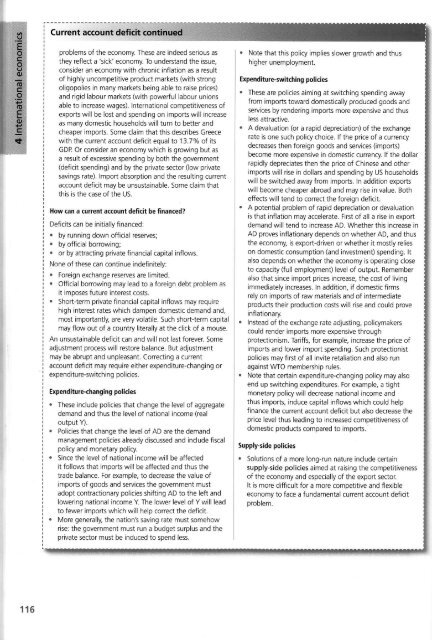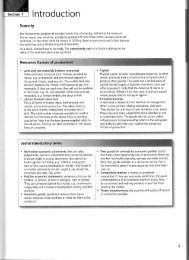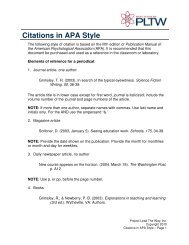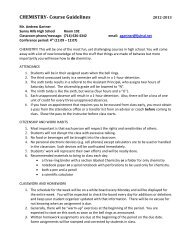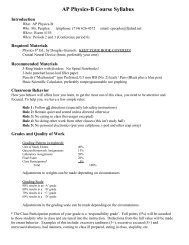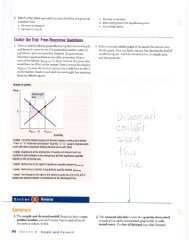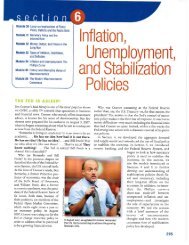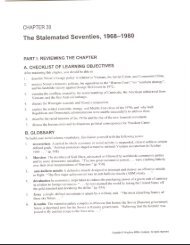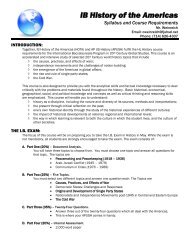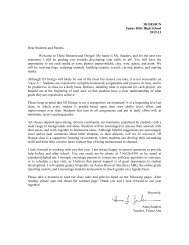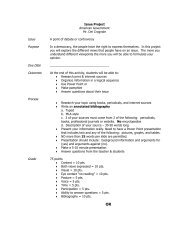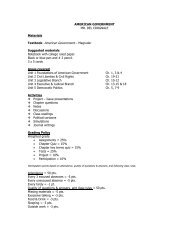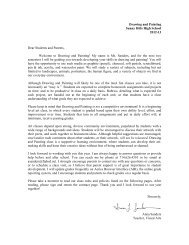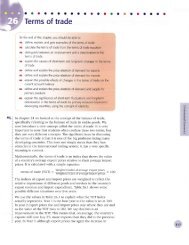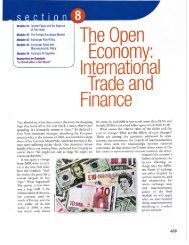IB Econ Study Guide Internationals - Sunny Hills High School
IB Econ Study Guide Internationals - Sunny Hills High School
IB Econ Study Guide Internationals - Sunny Hills High School
You also want an ePaper? Increase the reach of your titles
YUMPU automatically turns print PDFs into web optimized ePapers that Google loves.
116<br />
Current<br />
problems of the economy. These are indeed serious as . Note that this policy implies slower groMh and thus<br />
they reflect a 'sick' economy. To understand the issue,<br />
consider an economy with chronic inflation as a result<br />
higher unemployment.<br />
of highiy uncompetitive product markets (with strong Expenditure-switching policies<br />
oligopolies in many markets being able to raise prices)<br />
and rigid labour markets (with powerful labour unions<br />
able to increase wages). International competitiveness of<br />
exporls wil be lost and spending on imports wi I increase<br />
as many domestic households will turn to better and<br />
cheaper imports. Some claim that this describes Greece<br />
with the current account deficit equalto 13.7Vo of tts<br />
GDP Or consider an economy which is growing but as<br />
a result of excessive spending by both the government<br />
(deficit spending) and by the private sector (low private<br />
savings rate). lmport absorption and the resulting current<br />
account de|cit may be unsustainable. Some claim that<br />
this is the case of the U5.<br />
. These are policies aiming at switching spending away<br />
from imporls toward domestically produced goods and<br />
services by rendering imports more expensive and thus<br />
less attractive.<br />
. A devaluation (or a rapid deprecialion) of the exchange<br />
rate is one such policy choice. lf the price of a currency<br />
decreases then foreign goods and services (imports)<br />
become more expensive in domestic currency. lf the dollar<br />
rapidly depreciates then the price of Chinese and other<br />
imports will rise in dollars and spending by US househoids<br />
will be switched away from imports. In addition expofts<br />
will become cheaper abroad and may rise tn value. Both<br />
effects will tend to correct the foreign deficit.<br />
How can a curlent account deficit be financed?<br />
A potential problem of rapid depreciation or devaluation<br />
is that inflation may accelerate. First of all a rise in export<br />
Deficits can be initially financed:<br />
demand will tend to increase AD. Whether this increase in<br />
. by runninq down official reserves;<br />
AD proves inflationary depends on whether AD, and thus<br />
. by official borrowing;<br />
. or by attracting private financial capital inflows.<br />
the economy, is export-driven or whether it mostly relies<br />
on domestic consumption (and investment) spending. lt<br />
None of these can continue indefinitely:<br />
. Foreign exchange reserves are limited.<br />
. Official borrowing may lead to a foreign debt problem as<br />
it imposes future interest costs.<br />
. Short-term private financial capital inflows may require<br />
high interest rates which dampen domestic demand and,<br />
most importantly, are very volatile. Such short-term capital<br />
may flow out of a country literally at the click of a mouse.<br />
also depends on whether the economy is operating close<br />
to capacity (full employment) level of output. Remember<br />
also that since import prices increase, the cost of living<br />
immediately increases. In addition, if domestic firms<br />
rely on imports of raw materials and of intermediate<br />
products their production costs will rise and could prove<br />
inflationary<br />
Instead of the exchange rate adjusting, policymakers<br />
could render imports more expensive through<br />
An unsustainable deficit can and will not last forever Some protectionism. Tariffs, for example, increase the price of<br />
adjustment process will restore balance. But adjustment rmports and lower import spending. Such protectionist<br />
may be abrupt and unpleasant. Correcting a current<br />
policies may first of all invite retaliation and also run<br />
account deficit may require either expenditure-changing or against WTO membership rules.<br />
expenditure-switching policies.<br />
. Note that certain expenditure-changing policy may also<br />
Expenditure.changing policies<br />
end up switching expenditures. For example, a tight<br />
monetary poliry will decrease national income and<br />
These include policies that change the level of aggregate<br />
demand and thus the level of national income (real<br />
output Y).<br />
Policies that change the level of AD are the demand<br />
thus imports, induce capital inflows which could help<br />
finance the current account deficit but also decrease the<br />
price level thus leading to increased competitiveness of<br />
domestic products compared to impoars.<br />
management policies already discussed and include fiscal<br />
policy and monetary policy.<br />
Supply-side policies<br />
Since the level of national income will be affected . Solutions of a more long-run nature include certain<br />
it follows that imporls will be affected and thus the<br />
supply-side policies aimed at raising the competitiveness<br />
trade balance. For example, to decrease the value of<br />
of the economy and especially of the export sector.<br />
imports of goods and services the government must<br />
It is more difficult for a more competitive and flexible<br />
adopt contractionary policies shifting AD to the left and economy to face a fundamental current account deficit<br />
lowering national income Y The lower level of Y will lead<br />
to fewer imports which will help corred the deficit.<br />
More generally, the nation3 saving rate must somehow<br />
rise: the government must run a budget surplus and the<br />
private sector must be induced to spend less.<br />
problem.


